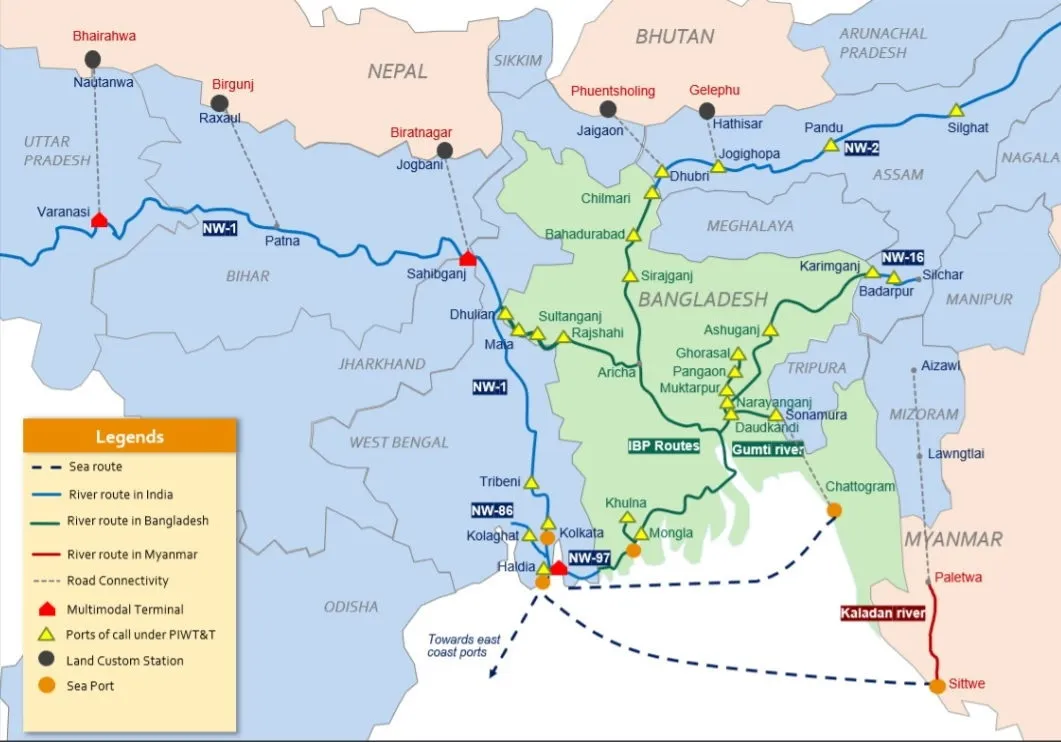Bangladesh's Prime Minister, Sheikh Hasina has proposed that India’s landlocked North East region can use the Chittagong port to enhance trade with the region.
India and Bangladesh are already eagerly looking forward to getting the connectivity between the two countries back to pre-Covid levels by resuming cross-border bus and railway services shortly after Eid.
Hasina told visiting External Affairs Minister S Jaishankar in Dhaka on Thursday that the connectivity between the two neighbouring countries can further be strengthened if the Indian states like Assam and Tripura have access to the Chittagong seaport.
With two stretches of Indo-Bangladesh Protocol (IBP) route currently being developed with a budget of Rs 305 crore, the move, if implemented, would give a major push to Prime Minister Narendra Modi's 'Act East' policy, which seeks to the integrate the economies of the northeast with the 10-nation Association of Southeast Asian Nations (ASEAN).
India has maintained for a long time now that developing the waterway connectivity is a further amplification of India's 'Act East' Policy which focuses on New Delhi's outreach towards its eastern maritime neighbours, especially the 10-nation ASEAN and island territories with a large Indian diaspora.

External Affairs Minister S Jaishankar with Bangladesh PM Sheikh Hasina in Dhaka on Thursday (Image courtesy: Twitter/@DrSJaishankar)
This includes promoting various initiatives like connecting the North East Region with Bangladesh, improving access to North East from Myanmar to facilitate tourism and cross border connectivity, promotion of Land Border Crossing Agreement and Integrated Check Post at Moreh and infrastructure projects like India-Myanmar-Thailand trilateral highway, Kaladan Multi Modal Transit Transport Project (KMMTTP) in Myanmar.
At the same time, India has embarked on developing an 'Eastern Grid' inland waterway – a system of multi-modally interconnected waterways and coastal routes – to kick start regional integration in the South Asian Region (SAR) and to facilitate regional trade between South and East Asia.
As reported by IndiaNarrative.com earlier, India and Bangladesh in particular are taking the lead in advancing policies and investments in developing potential inland waterways.
![]() As the food grain movement continues to take place via National Waterway-1 (river Ganga), NW-97 (Sunderbans), Indo-Bangladesh Protocol (IBP) route and NW-2 (river Brahmaputra), the big move to steer economic resurgence of India's North East region by establishing the technical and commercial viability of the 2350 km long integrated Inland Water Transport (IWT) route has already begun.
As the food grain movement continues to take place via National Waterway-1 (river Ganga), NW-97 (Sunderbans), Indo-Bangladesh Protocol (IBP) route and NW-2 (river Brahmaputra), the big move to steer economic resurgence of India's North East region by establishing the technical and commercial viability of the 2350 km long integrated Inland Water Transport (IWT) route has already begun.
The Pandu Ship repair facility being developed in Guwahati is expected to not only boost trade activity with the neighbouring countries but also open doors to the geostrategic Southeast Asian waters.

Jaishankar highlighted in Dhaka on Thursday that trade, disbursement of loans on bilateral projects, travel services and investment are at new heights and that they have recovered the momentum which was lost during the Covid.
"We, of course, hope to see early commissioning now of many projects including in the power and energy sector, in connectivity so that all that we have done in the last few years can be taken forward. India also looks forward to a stronger sub-regional cooperation in connectivity and other areas," said the EAM.
He emphasised that the energy sector, particularly the hydropower domain, offers opportunities for mutually beneficial cooperation between countries of the region.
"India is a large producer and consumer of energy and we are very glad to work with our neighbours in that regard, including in the BBIN framework. And I want to say that India will continue to take the lead to structure progressive partnerships for production, transmission and trade in our region in this area," he added.
Also Read: India's Act East policy takes wings with water connectivity with neighbours as focus




















